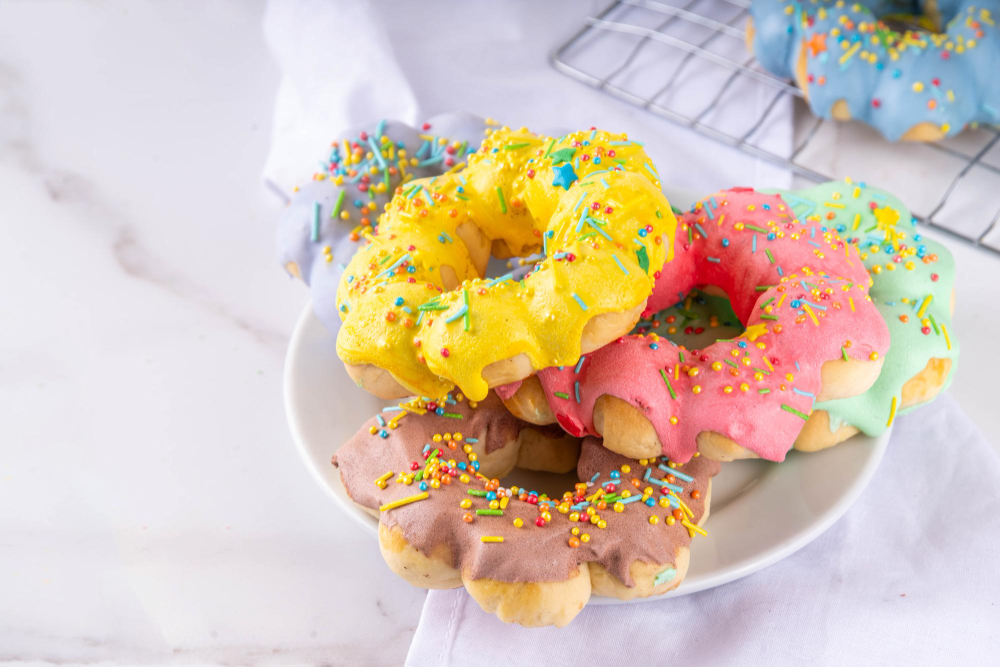What Are Mochi Donuts?
Are mochi donuts gluten free? This inquiry frequently comes up for individuals with gluten sensitivities or celiac disease. In this article, we will discuss this topic in detail.
Mochi donuts are a delightful fusion of traditional Japanese mochi and classic donut textures. They originate from the unique combination of glutinous rice flour, which gives them a chewy consistency, and the sweet flavors typically found in donuts. This innovative treat has gained popularity worldwide, particularly in the United States, where they are often available in various flavors and toppings.
The appeal of mochi donuts lies in their distinctive texture, which is unlike any other donut. Unlike regular donuts that may be airy and fluffy, mochi donuts offer a satisfying chewiness that many find irresistible. They are typically shaped in a ring form and can be glazed, dusted with powdered sugar, or topped with various ingredients, such as sprinkles or chocolate.
For a deeper dive into this topic, check out Are Mochi Donuts Gluten Free for an extensive breakdown of gluten-free alternatives and preparation tips.
Understanding Gluten and Its Sources
Gluten is a protein found predominantly in wheat and its derivatives. It plays a crucial role in providing elasticity and structure to baked goods. However, many people face health challenges associated with gluten, including celiac disease and gluten sensitivity. Consequently, they seek gluten-free alternatives in their diets.Common sources of gluten include:
- Wheat (including varieties like spelt and durum)
- Barley
- Rye
- Certain processed foods containing gluten as a binding agent
Understanding the sources of gluten is essential, especially when considering whether mochi donuts are gluten free. Since traditional donuts are made from wheat flour, it is vital to examine the flour used in mochi donuts closely. As mentioned earlier, mochi donuts typically utilize glutinous rice flour, which is inherently gluten free. However, cross-contamination can occur during production, making it essential to ensure that the specific brand or recipe is safe for those avoiding gluten.
Are Mochi Donuts Traditionally Gluten Free?
Traditionally, mochi donuts are not inherently gluten free because they often contain wheat flour in addition to glutinous rice flour. While the glutinous rice flour is naturally free of gluten, wheat flour is typically added to the batter to provide structure and a more traditional donut texture. This combination of ingredients results in a product that is chewy yet bouncy, but unfortunately not suitable for those avoiding gluten.
However, the glutinous rice flour in mochi donuts does play a significant role in the dough’s texture. It’s the starch in this flour that gives mochi its chewy consistency, which is a characteristic feature of both mochi cakes and mochi donuts. So, while traditional recipes may not be gluten-free, it’s possible to adapt them with substitutions to meet dietary needs.
If you are concerned about gluten, it’s crucial to check the ingredient list when buying or ordering mochi donuts, as many recipes may include wheat flour.

How to Identify Gluten-Free Mochi Donuts
Identifying gluten-free mochi donuts may seem straightforward, but it requires careful attention to detail. Here are several steps to ensure that the mochi donuts you choose are safe to consume:
- Check the Ingredients: Read the label carefully. Look for glutinous rice flour as the primary ingredient and avoid any mention of wheat flour or gluten-containing ingredients.
- Look for Certification: Many brands offer gluten-free certifications on their packaging. This certification indicates that the product has been tested and meets specific gluten-free standards.
- Inquire at Restaurants: When dining out, don’t hesitate to ask the staff about the ingredients used in their mochi donuts. Knowledgeable staff can provide valuable information about cross-contamination and preparation methods.
- Homemade Options: Consider making mochi donuts at home using gluten-free recipes. This way, you have complete control over the ingredients and can ensure they are safe for your dietary needs.
By following these guidelines, you can confidently determine whether mochi donuts are gluten free and enjoy them without worry.
Learn more about this process with helpful tips at Are Mochi Donuts Gluten Free?.
Homemade Gluten-Free Mochi Donuts
For those who prefer a completely gluten-free experience, making mochi donuts at home is a great solution. With a few ingredient substitutions, you can create delicious, chewy donuts that are entirely free from gluten. Here’s a simple guide to making your own gluten-free mochi donuts:
Ingredients:
- 1 cup of glutinous rice flour (sweet rice flour)
- 1/2 cup of tapioca flour (for added chewiness)
- 1/4 cup of sugar (adjust according to your sweetness preference)
- 1/2 tsp of baking powder (ensure it’s gluten-free)
- 1/4 tsp of salt
- 1/2 cup of milk (dairy or dairy-free options like almond milk work)
- 1 egg (for binding)
- 1 tsp of vanilla extract
- Vegetable oil for frying
- Optional: flavorings like matcha powder, cocoa powder, or fruit puree
Directions:
- Mix the dry ingredients: In a bowl, combine the glutinous rice flour, tapioca flour, baking powder, sugar, and salt.
- Add the wet ingredients: In a separate bowl, whisk together the milk, egg, and vanilla extract. Pour this mixture into the dry ingredients and stir until a dough forms.
- Shape the dough: Once the dough has come together, divide it into small portions and shape them into donut forms (you can use a donut mold or shape them by hand).
- Fry the donuts: Heat oil in a deep pan to around 350°F (175°C). Fry the donuts in batches until golden brown, approximately 3-4 minutes per batch.
- Drain and glaze: After frying, drain the donuts on a paper towel and let them cool. If desired, coat them in a glaze or sprinkle with powdered sugar.
By following these steps, you can make delicious gluten-free mochi donuts that capture the unique texture and flavor without compromising your dietary needs.

Health Benefits and Considerations
When considering whether mochi donuts are gluten free, it’s important to look at both the health benefits and potential concerns associated with the ingredients used.
Health Benefits:
- Gluten-Free: For those with gluten sensitivity or celiac disease, homemade gluten-free mochi donuts offer a safe alternative to traditional donuts made with wheat flour.
- Low in Allergens: Using glutinous rice flour, these donuts often lack common allergens such as wheat, soy, and dairy (when substitutions are made).
- Chewy Texture: The starch in glutinous rice flour provides a unique chewy texture that may be more satisfying for some people compared to regular donuts.
Considerations:
- High in Sugar: Like most donuts, mochi donuts can be high in sugar, which can contribute to weight gain and other health issues if consumed in excess.
- Caloric Density: While they are gluten-free, mochi donuts are still a deep-fried treat, which means they are calorie-dense. Moderation is key when incorporating them into a balanced diet.
- Cross-Contamination Risk: If you are extremely sensitive to gluten, be cautious when purchasing pre-made mochi donuts or dining out. Cross-contamination is always a possibility, especially in restaurants or bakeries that handle both gluten-free and gluten-containing foods.
FAQ’s:
Do Mochi Donuts Have Gluten in Them?
Traditional mochi donuts often contain gluten, especially if they include wheat flour as an ingredient in addition to glutinous rice flour (sweet rice flour). While glutinous rice flour is naturally gluten-free, many recipes combine it with wheat flour to provide structure and texture typical of regular donuts.
Therefore, unless specifically labeled or made with entirely gluten-free ingredients, mochi donuts may contain gluten. If you’re following a gluten-free diet, it’s crucial to check the ingredients or opt for recipes and brands that guarantee gluten-free options.
Does Mochi Contain Gluten?
Mochi, the Japanese rice cake made primarily from glutinous rice flour, is naturally gluten-free. Glutinous rice flour, despite the name “glutinous,” does not contain gluten. The term refers to the sticky, glue-like texture that the flour creates when mixed with water. Mochi serves as a safe option for those avoiding gluten, provided no gluten-containing additives or flavorings enter during preparation. However, if cooks use mochi in a dish with gluten-containing ingredients or if cross-contamination occurs during processing, it can become unsuitable for individuals with gluten sensitivities.
What Is Mochi Donut Dough Made Of?
The dough for mochi donuts is made using a combination of glutinous rice flour (also known as sweet rice flour), tapioca flour, sugar, and other ingredients like milk, eggs, and flavorings. The glutinous rice flour provides the signature chewy texture, while the tapioca flour adds to the softness and elasticity of the dough. Some recipes may also include baking powder to help the dough rise. Typically, wheat flour is used alongside these gluten-free flours to create a more traditional donut texture. However, if you’re making gluten-free mochi donuts, you can simply substitute the wheat flour with more gluten-free ingredients.
Are Hello Mochi Donuts Gluten-Free?
Hello Mochi, a popular brand that makes mochi donut, offers both regular and gluten-free versions of their donuts. Their gluten-free mochi donut are made using glutinous rice flour and other gluten-free ingredients, making them a safe choice for those who need to avoid gluten. However, as with any packaged food, it’s important to check the packaging for specific certifications or ingredient lists, especially if you have a gluten sensitivity or celiac disease. For added safety, some brands, like Hello Mochi, label their gluten-free products clearly, so look for the “gluten-free” label when purchasing.
Exploring resources like Are Mochi Donuts Gluten Free? can help you identify safe options.

Conclusion
The question of whether mochi donuts are gluten-free depends on the specific ingredients used in their preparation. While traditional mochi-based desserts, such as mochi ice cream or daifuku, are naturally gluten-free because they are made with glutinous rice flour (also called sweet rice flour or mochiko), the same cannot always be said for mochi donuts.
Mochi donuts, also known as “pon de ring” donuts, are a hybrid between Japanese mochi and American-style donuts, often featuring a chewy, bouncy texture. The primary ingredient that determines whether mochi donuts are gluten-free is the type of flour used. Many mochi donut recipes combine glutinous rice flour with wheat flour, which contains gluten, to achieve the perfect texture—making them not gluten-free in most cases. However, some variations are made exclusively with glutinous rice flour, making them safe for individuals with gluten intolerance or celiac disease.
For those following a strict gluten-free diet, it is essential to check the specific ingredients used in store-bought or restaurant-prepared mochi donuts. Cross-contamination is another concern, especially if the donuts are fried in the same oil as gluten-containing pastries. Certified gluten-free mochi donuts should be made in dedicated gluten-free kitchens to ensure safety for those with severe gluten allergies or celiac disease.
Gluten-free alternatives to traditional mochi donuts can be made using 100% glutinous rice flour, tapioca starch, or other gluten-free flours like almond or coconut flour. These versions still maintain the signature chewy texture but eliminate the risks associated with gluten. Additionally, many homemade recipes allow for customization, enabling individuals to control the ingredients and avoid potential sources of gluten contamination.
In conclusion, while some mochi donuts can be made gluten-free, the majority of commercially available mochi donuts contain wheat flour and are not safe for individuals with gluten sensitivity or celiac disease. Checking ingredient labels, asking about preparation methods, or making homemade gluten-free mochi donuts using pure glutinous rice flour are the best ways to ensure they are truly gluten-free. As awareness of dietary restrictions grows, more bakeries and brands are beginning to offer gluten-free mochi donut options, making this delicious treat accessible to a wider audience.

